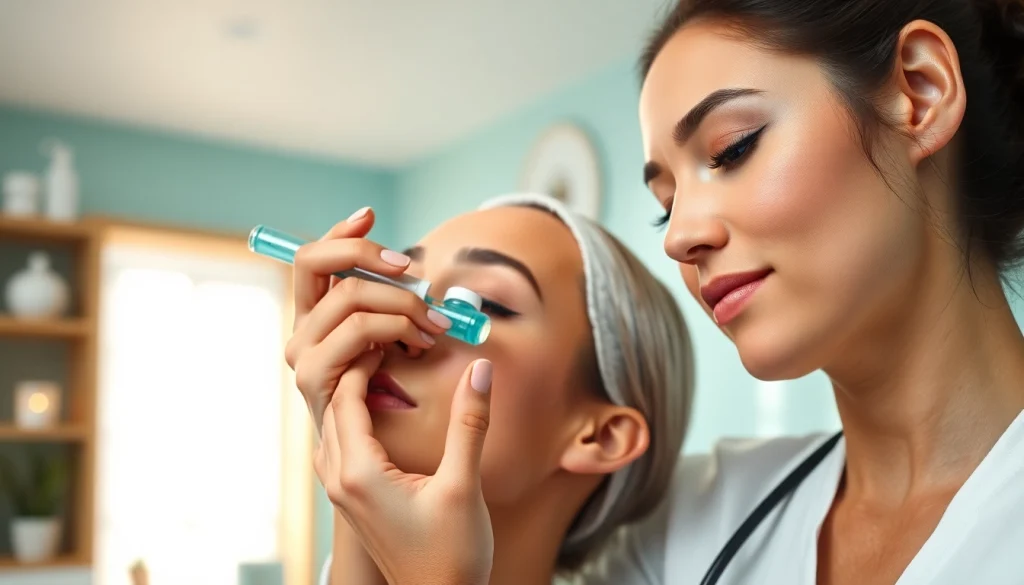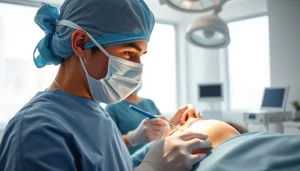Comprehensive Guide to Effective Acne Treatment Strategies for Clear Skin

Understanding Acne: Causes and Types
What is Acne?
Acne is a common dermatological condition that primarily affects adolescents and young adults, although it can occur at any age. It manifests as a variety of blemishes, including pimples, cysts, and blackheads, often appearing on the face, back, chest, and shoulders. Acne is not merely a cosmetic concern but can also have profound psychological impacts, affecting self-esteem and overall quality of life. At its core, acne arises from the clogging of hair follicles with oil and dead skin cells, creating an environment conducive to the proliferation of bacteria.
Common Types of Acne
Understanding the various types of acne can help in tailoring effective Acne Treatment strategies:
- Whiteheads: Small, round, and white raised bumps which occur when pores are clogged, sealing the bacteria and oil underneath.
- Blackheads: Similar to whiteheads, but are open at the surface, which causes oxidation and results in a dark appearance.
- Papules: Small red bumps that occur when the walls of the hair follicles break down, indicating inflammation and irritation.
- Pustules: Larger than papules, these are red, inflamed bumps that contain pus, often painful to the touch.
- Cysts: Deep, painful lumps under the skin filled with pus; cystic acne is the most severe form of acne and often leads to scarring.
Factors Contributing to Acne Development
A myriad of factors can trigger without triggering acne, including:
- Hormones: Fluctuations in hormones, particularly during puberty, menstrual cycles, or hormonal contraceptive use, can lead to increased oil production.
- Diet: Some studies indicate that a diet high in refined sugars and dairy can exacerbate acne.
- Stress: Stress can lead to hormonal changes that may increase oil production.
- Medications: Certain medications, including those containing corticosteroids, can promote acne.
Topical Solutions for Acne Treatment
Popular Ingredients in Acne Treatments
When exploring effective topical treatments for acne, several ingredients stand out:
- Benzoyl Peroxide: A powerful antibacterial agent that helps reduce acne-causing bacteria and prevent clogged pores.
- Salicylic Acid: A beta-hydroxy acid that exfoliates the skin and penetrates pores, effectively treating stubborn blackheads and whiteheads.
- Retinoids: Derivatives of Vitamin A that promote cell turnover, preventing clogged pores and reducing inflammation.
- Azelaic Acid: This ingredient has both antibacterial and anti-inflammatory properties, and is effective in treating acne and rosacea.
How to Apply Topical Medications Effectively
Proper application of topical treatments is essential for achieving desired results:
- Cleanse: Begin with a gentle cleanser to remove impurities and excess oil.
- Apply: Use a pea-sized amount of the topical medication, spreading it evenly across the affected areas.
- Moisturize: Follow up with a non-comedogenic moisturizer to prevent dryness.
- Consistency: Use the treatment consistently, typically once or twice a day, and allow time for improvement.
Considerations for Sensitive Skin
Individuals with sensitive skin must take additional precautions:
- Patch Test: Always perform a patch test before fully applying a new treatment to avoid adverse reactions.
- Start Slow: Introduce one product at a time to monitor for sensitivity and gradually increase usage.
- Hydration: Keep the skin well-hydrated with gentle, soothing products.
Oral Medications for Severe Acne Treatment
Overview of Common Oral Medications
For moderate to severe acne cases, oral medications may be an effective solution:
- Antibiotics: Commonly prescribed antibiotics, such as doxycycline and minocycline, help reduce inflammation and kill acne-causing bacteria.
- Oral Retinoids: Tretinoin and isotretinoin (Accutane) are powerful retinoids that can drastically improve severe acne.
- Hormonal Treatments: For females, hormonal therapies such as birth control pills can help regulate hormones that trigger acne.
Benefits and Side Effects of Oral Treatments
While oral medications can significantly improve acne, they may come with side effects:
- Antibiotics: Prolonged use can lead to antibiotic resistance and may cause gastrointestinal discomfort.
- Oral Retinoids: These can cause severe birth defects if taken during pregnancy, along with other side effects like dry skin, chapped lips, and potential liver issues.
Consulting a Dermatologist for Prescription Options
Please consider consulting a dermatologist for personalized advice on oral medications. A professional can provide tailored recommendations based on your skin type and acne severity, and help manage any potential side effects while monitoring your progress.
Innovative Therapies in Acne Treatment
Exploring Laser and Light Therapy
Laser and light therapies have emerged as innovative options in acne treatment:
- Blue Light Therapy: Targets the bacteria Propionibacterium acnes, reducing inflammation while treating active acne.
- Laser Treatments: Focus on acne scars and help remodel the skin, improving texture and reducing pigmentation.
The Role of Chemical Peels in Treatment
Chemical peels involve applying a solution to exfoliate the outer layers of skin, proving beneficial in treating acne and minimizing scars.
- Glycolic Acid Peels: Help unclog pores and smooth skin texture.
- Salicylic Acid Peels: Effective on oily skin types, they exfoliate and prevent future breakouts.
Microdermabrasion and Its Benefits
Microdermabrasion is a non-invasive procedure that exfoliates the skin, removing dead skin cells and promoting new cell growth:
- Improved Texture: It helps to reduce the appearance of acne scars and enhances overall skin texture.
- Minimized Pores: Regular treatments can help maintain smaller, clearer pores.
Long-Term Maintenance of Acne-Free Skin
Establishing a Skincare Routine
Developing a consistent skincare routine is crucial for maintaining clear skin:
- Gentle Cleanser: Cleanse twice daily with a mild, non-comedogenic cleanser.
- Moisturizer: Use oil-free moisturizers to keep skin hydrated without clogging pores.
- Regular Exfoliation: Exfoliate weekly to remove dead skin cells and promote cell turnover.
- Sun Protection: Apply sunscreen daily to protect skin from harmful UV rays and prevent hyperpigmentation.
Preventative Measures for Acne
Taking proactive steps can help reduce future breakouts:
- Avoid Picking: Avoid squeezing or picking at acne to prevent scarring and further irritation.
- Stay Hydrated: Drink plenty of water to maintain skin hydration and support overall health.
- Balanced Diet: Include antioxidants and omega-3 fatty acids to support skin health.
When to Seek Professional Help
If acne persists despite at-home treatments, consulting a skincare professional can provide significant benefits. A dermatologist can evaluate the severity of the condition, recommend appropriate medical treatments, and determine the most effective therapy regimen tailored to individual needs.







